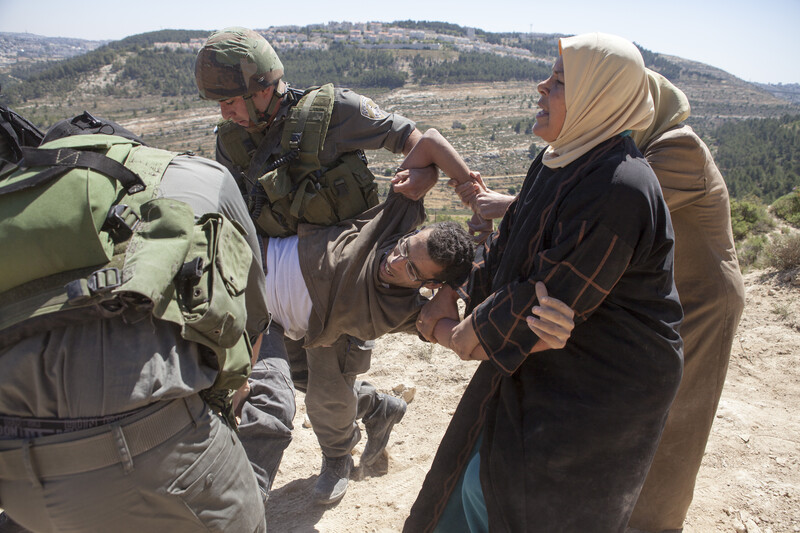The Electronic Intifada 12 October 2020

Mahmoud al-Araj, the father of Bassel al-Araj, salutes his son’s body during his funeral in al-Walaja, his home village in the occupied West Bank, on 17 March 2017.
ActiveStillsSince his killing, Bassel al-Araj has become one of the most recognizable icons in Palestine.
The image of the revolutionary activist – a pharmacist by trade and education and unaffiliated to any of the existing Palestinian factions – his signature black-framed glasses perched on his nose, a gun strapped over his shoulder and wrapped in a checkered keffiyeh, adorns neighborhoods up and down streets in the occupied West Bank.
And al-Araj’s influence on friends and fellow activists has grown even stronger more than three-and-a-half years after the 31-year-old was killed in a stand-off with Israeli forces in al-Bireh on the outskirts of Ramallah on 6 March 2017.
His death was deeply disturbing to Palestinians, not least because of the role of the Palestinian Authority. His family accused the PA of complicity in his killing.
Al-Araj, along with five others, was arrested by PA security forces at the end of March and the beginning of April 2016 and held for nearly six months on allegations of planning an attack on Israelis, Israeli media reported at the time.
They were subjected to torture and ill-treatment in jail, prompting them to launch a hunger strike until they were released in September 2016.
Al-Araj came to be known as the victim of security coordination between the PA and Israel, which he vocally opposed through his writing.
READ MORE: In 2018, Bassel al-Araj’s writings were collected in a book titled after a line in his will, I Have Found My Answers. The Electronic Intifada has translated an excerpt from the book here.
Eventually, most of the men were rearrested by Israeli forces and put in administrative detention – imprisonment without charge or trial.
Al-Araj, however, had gone into hiding.
It took months until the Israeli military located the activist and marched into al-Bireh where a two-hour stand-off ensued.
At the time, he was armed with a Carlo submachine gun – a homemade Palestinian gun based on a Swedish design – and an M16 rifle, the Israeli military said.
It was also reported that he was killed by Israeli forces after he had run out of ammunition.
“We’ve been missing the spirit of revolution that we had before Oslo and before the creation of the PA,” said Jamal Juma, a prominent Palestinian activist and coordinator of the Anti-Apartheid Wall Campaign.
The Oslo agreement, signed between Israel and the Palestine Liberation Organization in 1993, gave birth to the Palestinian Authority.
“Bassel acted as a kind of mirror to those legacies of resistance. He was an intellectual; he was criticizing everything and he was brave.”
Juma said al-Araj was a hero for a new generation that is in need of a message: “That they are still here and still resisting – and nothing, not even Oslo, can stop this tradition of resistance.”
Resistance is possible
Sheerin al-Araj remembers her nephew as a “simple and humble boy.”
“Bassel was very down to earth,” she told The Electronic Intifada. “He didn’t even believe in himself initially, but he was the most curious person I’ve ever met in my life.”
“He was reading a lot,” Sheerin added. “Ever since he was old enough to read, all my books started disappearing. I can’t find any of my books anymore.”
Al-Araj soon set out on a lifelong journey researching revolutions and figures from around the world – from Palestine, Vietnam, Algeria and South America to France – and became absorbed in various analyses, philosophies, political ideologies and theories.
Among the books found at his shelter were those written by Italian Marxist Antonio Gramsci and Mahdi Amel, a Lebanese Marxist assassinated in Beirut 30 years ago.
He had an “encyclopedic knowledge” of Palestinian history, said Ahmad, a close friend, who requested that The Electronic Intifada use a pseudonym out of fear for his personal security.
“He knew every character and every little detail. He knew our whole history by heart. His storytelling was something that really affected us,” Ahmad said.
“It was like he lived with the characters. He would bring all these historical Palestinian figures to life. He knew the stories behind the stories.”
He took this wealth of knowledge to the Popular University, an informal education project focused on teaching topics that are neglected in mainstream Palestinian university education, such as histories of resistance, settler colonial studies, the political economy of exploitation in Palestine and various other topics.
Al-Araj taught a course called “Palestinian resistance since the inception of settler-colonialism,” in which the activist took students through more than a century of Palestinian resistance, from Palestinian Ottoman history up until Israel’s military assaults on Gaza in 2008-2009 and 2012, in which more than 1,500 Palestinians, mostly civilians, were killed.
These were not just stories or lessons for al-Araj. He believed that for Palestinians to adequately respond to their current political situation, they had to look back to their history and find direction from their own unique traditions of resistance.
“I think what we suffer from, at least on the level of the so-called political leadership, is that these people are basically now turning defeat into an ideology and an institution called the Palestinian Authority, where they cooperate with the Israelis,” Ahmad said.
Defeat has also become a “way of life” in Palestine, Ahmad told The Electronic Intifada, particularly in the occupied West Bank, where society has shifted into new modes of consumerism and lives are predicated on free market capitalism and individualism.
According to Ahmad, al-Araj represented the “rejection of defeat” – and was willing to give his life for it.
“We cannot accept Palestinian defeat […] because settler-colonialism doesn’t leave any room for you to accept it; its aim is to eliminate you as a person and as an identity,” he told The Electronic Intifada.
Al-Araj attempted to help those around him realize that “resistance is possible,” Ahmad said.
“Resistance is something that can give Palestinians a new horizon. Something other than these ideologies of markets, consumerism, defeat and cooperation with colonialism that the PA represents.”
‘Authentic voice’
Al-Araj had a great impact on those he met. Ahmad described him as someone who talked a lot, was constantly telling stories, cracking jokes, while also openly confronting those he disagreed with.
“He was not shy about confronting people,” Ahmad told the Electronic Intifada. That also caused people to criticize and scorn him, his friend said.
But if al-Araj was talkative and social with friends, he was considered a loner by his family in al-Walaja, the small village between Bethlehem and Jerusalem where he was born, and was often misunderstood by those closest to him.
“He spent most of his time at home in front of a computer and reading,” Sheerin said.
“So for us, he was this isolated boy. If he speaks about anything, it’s always something far-fetched. No one gave him a lot of attention and not many people could understand him.”
It was not al-Araj’s political thought that set him apart from other activists. In fact, many young Palestinians hold similar ideologies. But Bassel was significant because he was “truly authentic,” Ahmad said.
“He was true to his word and that’s something we miss today in Palestine.”
“Bassel’s idea of knowing was actually trying,” Sheerin told The Electronic Intifada.
“This man was not just thinking theoretically, he was very much applying what he said. He knew that things cannot just be said. It has to be tried and applied.”

Bassel al-Araj being detained during protests against Israel’s wall in his home village of al-Walaja in 2010.
Sheerin recounted a conversation they’d had – one of many that would last for hours on end, debating and discussing various resistance strategies and theories. Al-Araj had asked Sheerin about her work with women in their village which is set to be almost entirely encircled by Israel’s separation wall.
Sheerin explained her idea for a recycling project. It did not take long for al-Araj to begin downloading resources from the internet and litter his house with scattered items that he attempted to recycle.
“Bassel was someone who knew that you couldn’t just throw words at people or encourage them to do things that you yourself don’t know how to do,” Sheerin said.
He approached resistance and activism the same way.
In 2010, he studied the popular resistance movements that were emerging in villages like Bilin and Nabi Saleh, where weekly protests are held against the Israeli occupation. But after a few years, he concluded that the methodology was ineffective, Sheerin said.
He then redirected his energy into equipping Palestinians with historical and theoretical knowledge for when the right time comes to resist.
“He was generating this [sense of] heroism around Palestine and planting it in others,” Sheerin explained.
He quit his job as a pharmacist partly because the pharmacy sold Israeli products when Palestinian alternatives existed and began researching full time, Ahmad said.
But an apparently spontaneous 2015 uprising – sometimes referred to as the habba, sometimes as the “intifada of individuals” – changed al-Araj’s political trajectory. According to his friends and family, he believed that this was a significant uprising and decided that he wanted to be a part of it.
‘The entire Palestinian story’
The young activist was outspoken about his support for armed resistance. But Sheerin had always assumed it was just another one of their theoretical debates that they had engaged in for many years.
“Bassel always told me that you can’t say something without doing it,” Sheerin said. “You can’t tell people that this is the right way and not be prepared to do it yourself. But I never thought he would take it to this step.”
The family was “shocked” by al-Araj’s arrest and his subsequent assassination, Sheerin said.
“The minute he was arrested was when his family started learning more about him. The family didn’t really understand what he was doing or why he was doing it. But it was after his death that they started to realize why he had quit his pharmacy career and that he wasn’t just a crazy man who decided to do something out of the blue.”
According to Sheerin, al-Araj’s death also served to unite al-Walaja, which had been divided over social and political disagreements.
“We have a lot of problems with the Israelis and we were divided over how we should confront them. But everyone came together with his death. The whole village came to Bassel’s funeral and mourned as if it was their own son who was killed,” Sheerin said.
His assassination elevated him to the status of an icon. Many Palestinians who had never heard of al-Araj began familiarizing themselves with the activist’s writings and ideologies.
Juma believes it was a combination of his personality and the manner of his death that has made al-Araj’s story so resonant among Palestinians, and more powerful than those of other Palestinian activists who have been killed by Israeli troops or spies.
“Bassel was an intellectual and at the same time he believed in armed resistance,” Juma said.
“He brought together these two things that reminded people of the fighters of the 1960s and 1970s – like Ghassan Kanafani and Mahmoud Darwish – when the armed struggle was connected to the arts, literature, and intellectualism.”
“And at the end he didn’t surrender,” Juma added. “He was killed fighting. He died with his gun next to him. Up until the last moment he was resisting.”
Juma said that reflection of an oft-told past resistance as well as the embodiment of an anger that is widespread among Palestinian youths has made him a representative of an entire generation.
“Young people saw themselves in Bassel. He represented the anger inside them that they can’t express. They saw in Bassel the entire Palestinian story – the uncertainty of the future, the fear, the dignity and the spirit and desperation for revolution.”
Ahmad says he thinks al-Araj still has an influence on a new generation of activists and youths who are “looking for different ways to confront a hopeless situation.” His influence is hard to point out in a concrete way, Ahmad said, but it’s “there in the background.”
Sheerin told The Electronic Intifada that the central reason young Palestinians were attracted to al-Araj after his death was because “he was honest in every single thing he did or said … to the extreme.”
“His honesty is what made him an icon,” she said. “We dream of having leaders with the kind of honesty that Bassel had. He is the dream for all of us and he is the kind of person we want to lead us. He lived up to his word.”
But the ones who were impacted the most, according to Ahmad, were those who knew him personally.
“For him Palestine was the sole purpose of every little fiber in his being. He had this energy around Palestine and a hope in the Palestinian cause that you see in very few people. Nobody was as energetic,” Ahmad said.
Al-Araj’s singular quality, according to Ahmad, was his optimism. Bassel, Ahmad said, saw Palestine as “the answer to his existential questions.”
“He truly believed and he had hope. He committed himself 24 hours a day to the struggle … That’s what made him so central and influential for a lot of us, because we saw hope in him. That energy is what we really miss.”
Bassel’s will was found among his possessions in the shelter where he was killed.
It read:
Greetings of Arabism, the homeland and liberation.
If you are reading this, then I have died, and my soul has ascended to its Creator. I pray to God that I meet Him with a sound heart, with total sincerity, without an iota of hypocrisy.
It is hard to write one’s own will. I have read for many years the wills of martyrs and have always been puzzled by them: quick, brief, short on eloquence and without satisfying our search for answers to our questions about martyrdom.
I am now on the path to my fate satisfied and convinced that I have found my answers.
How foolish I was. Is there anything more eloquent than the martyr’s act? I was supposed to write this months ago, but what kept me from doing so was your questions, you, the living. Why should I answer you, look for yourselves. As for us, the people of the graves, we are only looking for the mercy of God.
Jaclynn Ashly is a freelance journalist often covering human rights and politics.





